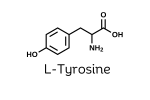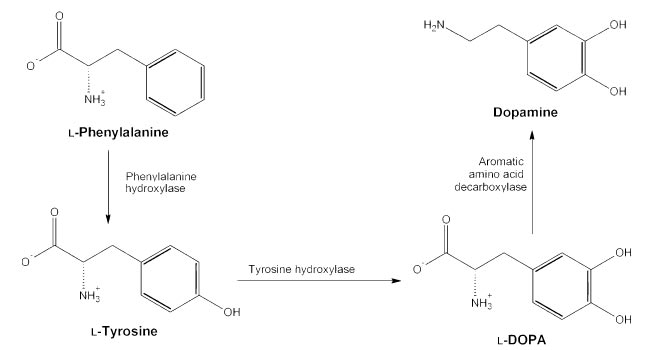
Ever felt the relentless pressure of a high-stress job, the intense demands of sports training, or even something as grueling or rigorous as military drills? Have you ever been exposed to extreme temperatures that leave you feeling physically and mentally drained? In these moments, you’re standing on the edge of resilience, being challenged to push past your limits. This is where the powerful amino acid, L-Tyrosine, steps in. It’s a precursor to dopamine, which fuels our drive, focus, and resilience. In the face of such extreme stress, dopamine is like a rallying cry in our brain, pushing us forward. It’s the mental equivalent of David Goggins’ shouting: “Who’s gonna carry the boats?!” Whether you’re an athlete, a soldier, or anyone navigating high-stress situations, understanding the role of L-Tyrosine in managing physical and psychological stress can be a game-changer. Ready to dive in? Let’s explore how L-Tyrosine can help you answer the call, no matter how heavy your ‘boats’ may be.
What is L-Tyrosine?

L-Tyrosine, while classified as a non-essential amino acid, plays a pivotal role in our bodies and contributes significantly to our overall health. Despite not being ‘essential’ in the dietary sense, the importance of L-Tyrosine cannot be overstated. Our bodies have the ability to synthesize L-Tyrosine from another amino acid known as phenylalanine. In addition to this, L-Tyrosine can also be obtained from a variety of high-protein food sources such as poultry (chicken, turkey), fish, dairy products, and a range of nuts and seeds.
L-Tyrosine serves as a key component in creating vital neurotransmitters, with one of the most significant being dopamine, a chemical messenger that greatly influences our mood and motivation. The intricate process of dopamine synthesis is closely tied to L-Tyrosine.
When we face physical or psychological stress, these neurotransmitters are put to the test, and L-Tyrosine steps up to the plate. Its role in replenishing these crucial neurotransmitters helps our bodies better manage stress, making L-Tyrosine a silent hero in our physiological response to life’s challenges.
As we delve deeper, we’ll uncover the fascinating ways in which L-tyrosine supplementation, as a nootropic, supports cognition and stress management.

Why is Tyrosine Important?
L-Tyrosine isn’t just another amino acid. It’s the master key that unlocks the production of some of our most important neurotransmitters, the catecholamines pronounced as “kat-uh-KOHL-uh-meen”.
Here’s how it works: In our brains, an enzyme called tyrosine hydroxylase transforms L-Tyrosine into L-DOPA. Then, L-DOPA is converted into dopamine. From there, dopamine is transformed into norepinephrine, and finally, norepinephrine is converted into epinephrine, also known as adrenaline. This entire process is like a well-oiled assembly line, and L-Tyrosine is the first piece of the puzzle.
Now, let’s bring this down to earth with a real-life example. Imagine a nurse or a waitress after a grueling 12-hour shift. They’ve been on their feet all day, dealing with the physical demands of their job, the mental strain of multitasking, and the emotional challenges of managing patient or customer needs. This kind of intense stress can quickly drain their neurotransmitter levels, especially dopamine.
When dopamine levels drop, they might start to feel exhausted, less motivated, and find it harder to think clearly. But this is where L-Tyrosine comes in. By helping to replenish these neurotransmitters, L-Tyrosine supports our bodies in bouncing back from stress.
So, while L-Tyrosine might not be an ‘essential’ amino acid, it’s absolutely essential for helping us manage stress and maintain our cognitive function. And if you’re curious about the science behind all this, check out the graphic above for a visual breakdown of the process.
The Role of Tyrosine Supplementation
So, why consider tyrosine supplementation if it’s found in many protein-rich foods and our bodies can produce it from phenylalanine? The answer lies in the demands of our modern lifestyle. The pressures of work, poor diet, and lack of sleep can all increase the demand for tyrosine. In such cases, dietary intake and natural production might not be enough.
Tyrosine supplements can provide an additional source of this amino acid, ensuring our bodies have enough raw material to produce the necessary neurotransmitters. This can be particularly beneficial for individuals under high stress, those with demanding cognitive tasks, or people with conditions that affect phenylalanine metabolism.
As we continue to explore the world of dietary tyrosine here, we’ll delve deeper into the benefits of tyrosine supplementation and its role in supporting our health and well-being. Stay tuned as we unravel the fascinating role of tyrosine in our bodies.
Tyrosine and Stress: A Focus on Extreme Conditions
Sure, we all know stress. It’s that knot in your stomach after a tough day at the office or a spat with your significant other. But let’s be clear; we’re not talking about popping a Tyrosine supplement for those everyday stressors. No, Tyrosine steps up for the heavy hitters – the kind of stress that drains your neurotransmitters and depletes your dopamine levels.
Imagine the grueling stress endured by soldiers in extreme training drills or the sheer exhaustion faced by endurance athletes. This is the kind of stress that doesn’t just wear you down – it wipes you out completely. That’s where Tyrosine comes in, helping to replenish our neurotransmitters and manage this intense, all-consuming stress more effectively.

Consider a study conducted on cadets during a demanding military combat training course. The cadets were under extreme stress, both physically and mentally. The researchers provided some of the cadets with a protein-rich drink containing 2g of Tyrosine daily, while others received a carbohydrate-rich drink. Over a week of combat training, the cadets who supplemented with L-Tyrosine showed improved performance on memory and tracking tasks compared to those who didn’t. They also experienced a decrease in systolic blood pressure, suggesting a potential stress-buffering effect of L-Tyrosine.
Tyrosine and Performance Under Extreme Weather Conditions
But the benefits of L-Tyrosine don’t stop at high-stress situations. This powerful amino acid can also aid performance under extreme weather conditions. Imagine a mountaineer facing the harsh cold at high altitudes or a marathon runner pushing their limits in the scorching heat. These are situations where the body and mind are under significant stress, and maintaining optimal cognitive function can be a challenge.
Research has shown that L-Tyrosine can come to the rescue in such scenarios. A study by Banderet and colleagues involved participants who were subjected to cold stress. The participants were placed in a cold chamber with temperatures as low as -10 degrees Celsius. Those who were supplemented with L-Tyrosine showed a reversal of cold-induced working memory deficit, suggesting that L-Tyrosine can help maintain cognitive function in harsh cold conditions.
Similarly, another study by Lieberman et al. demonstrated that L-Tyrosine could potentially mitigate the effects of heat stress on cognitive function. The participants were subjected to heat stress in a chamber with temperatures up to 45 degrees Celsius. They were then asked to perform a variety of cognitive tasks. Those who were supplemented with L-Tyrosine showed improved cognitive performance compared to a placebo group, indicating that L-Tyrosine might help preserve cognitive function under extreme heat conditions.
These studies highlight the potential of L-Tyrosine in aiding cognitive performance under extreme weather conditions, further underscoring its role as a powerful ally in managing physical and psychological stress.
In conclusion, whether you’re a soldier on the battlefield, an athlete pushing your physical limits, or someone facing the challenges of extreme weather, L-Tyrosine shows promise as a supplement that can help you maintain cognitive function and manage stress more effectively.
Tyrosine: For Lowering Blood Pressure Under Stress

As we already discussed L-Tyrosine, is a naturally occurring amino acid, is known for its pivotal role in the production of crucial neurotransmitters. But its benefits don’t stop there. This versatile amino acid also plays a significant role in managing blood pressure, especially during stressful situations.
When stress strikes, our bodies respond by releasing hormones like norepinephrine and epinephrine. These hormones cause our heart to beat faster and our blood vessels to narrow, leading to a rise in blood pressure. L-Tyrosine, by replenishing these neurotransmitters, helps our bodies better manage these physiological responses, including the elevation of blood pressure.
Imagine you’re about to deliver a major presentation at work. The stress is mounting, your heart is pounding, and you can feel your blood pressure rising. This is where L-Tyrosine can come to your aid. By replenishing your neurotransmitters, it helps your body better cope with this stressful situation, potentially preventing a spike in your blood pressure.
This isn’t just a theory – scientific research supports it. A study published in the Brain Research Bulletin found that L-Tyrosine supplementation could improve cognitive performance and lower diastolic blood pressure in subjects under stress. In this study, subjects were given either 100 mg/kg of L-Tyrosine or a placebo before being subjected to a number of stress-sensitive tasks while being taunted with a stressor. The stressor in this case was a 90 dB noise, which is about as loud as a jackhammer or a lawn mower. The results showed that those who had taken L-Tyrosine performed better on cognitive tasks and had lower diastolic blood pressure 15 minutes after ingestion.
So, if you frequently find yourself under high stress and are concerned about its impact on your blood pressure, L-Tyrosine might be worth considering. However, always consult with a healthcare professional before starting any new supplement regimen. And remember, while L-Tyrosine can help manage stress-induced high blood pressure, it’s not a substitute for a healthy lifestyle and regular medical check-ups. Regular exercise, a balanced diet, and adequate sleep are all crucial for maintaining good health and managing stress.
Tyrosine and ADHD: A Potential Natural Aid
ADHD, or Attention Deficit Hyperactivity Disorder, is a condition that affects both children and adults, making it difficult for them to maintain focus and control impulses. It’s a complex disorder that can significantly impact a person’s daily life, from school performance in children to work productivity in adults.
One of the key players in managing ADHD symptoms is dopamine, a neurotransmitter that plays a crucial role in our ability to focus and maintain attention. And guess what? L-Tyrosine is a precursor to dopamine. This means that L-Tyrosine plays a vital role in the production of dopamine in our bodies.
Now, you might be wondering, “How does this relate to ADHD?” Well, some studies suggest that supplementing with L-Tyrosine might help improve symptoms of ADHD by boosting dopamine levels, thereby enhancing focus and attention.
For instance, a small study conducted in 1987 found that adults with ADHD showed an improvement in their symptoms during the first two weeks of supplementing with L-Tyrosine. However, by the sixth week, the participants had developed a tolerance, and by the eighth week, the initial effects of L-Tyrosine had leveled out. The study concluded that while L-Tyrosine might provide short-term benefits, it was not effective for long-term treatment of adult ADHD.
In addition to its potential benefits for ADHD, L-Tyrosine might also play a supportive role when used in conjunction with ADHD medications like Adderall and Ritalin. These medications work by increasing the levels of dopamine in the brain, and L-Tyrosine, being a precursor to dopamine, might enhance their effectiveness. However, it’s important to note that more research is needed in this area, and it’s crucial to consult with a healthcare professional before combining L-Tyrosine with any ADHD medication.
Tyrosine and Cognitive Flexibility aka Multi-tasking: A Closer Look at a Key Study

Ever find yourself juggling multiple tasks at once? Whether you’re a busy parent managing a household, a professional handling several projects, or a student studying for exams, multitasking is a part of our daily lives. But did you know there’s a way to make task-switching more efficient potentially? Let’s dive into a fascinating study that explored this very topic.
The Study at a Glance
In a study titled “Tyrosine promotes cognitive flexibility: evidence from proactive vs. reactive control during task switching performance,” researchers Laura Steenbergen and her team set out to investigate the effects of Tyrosine, a common amino acid, on our ability to switch tasks effectively.
How Was the Study Conducted?
The researchers carried out a double-blind, randomized, placebo-controlled study. This means that neither the participants nor the researchers knew who was receiving the Tyrosine supplement and who was getting a placebo. This approach ensures the results are unbiased and reliable.
What Did the Study Find?
The results were promising. The study found that compared to a placebo, Tyrosine reduced “switching costs” – the time it takes for us to shift our attention from one task to another. In other words, those who took Tyrosine were able to switch tasks more quickly and efficiently.
What Does This Mean for You?
In practical terms, this study suggests that Tyrosine supplementation could potentially help you improve your multitasking abilities. Whether you’re an air traffic controller managing multiple flights, a doctor in a busy emergency room, or a parent keeping up with your kids’ schedules, Tyrosine might just give you that cognitive edge you need.
Remember, while this study provides exciting insights into the potential benefits of Tyrosine, it’s always important to consult with a healthcare professional before starting any new supplement regimen.
The Takeaway
This study is a significant step forward in understanding how Tyrosine can support cognitive flexibility. It opens up new possibilities for those of us who are constantly multitasking and looking for ways to do it more effectively. So, the next time you’re feeling overwhelmed by your to-do list, remember: Tyrosine might just be the cognitive boost you need.
Tyrosine and Mood: A Potential Natural Mood Booster
Mood disorders, such as depression and anxiety, are common health issues that can significantly impact a person’s quality of life. Neurotransmitters, including dopamine, norepinephrine, and epinephrine, play a crucial role in regulating our mood. As we’ve discussed, L-Tyrosine is a key player in the production of these neurotransmitters.
So, could L-Tyrosine potentially help improve mood disorders? Some research suggests it might. For instance, a study conducted by Gelenberg and Gibson in 1984 found that L-Tyrosine supplementation could help alleviate symptoms of depression. In this study, participants with depression were given L-Tyrosine for four weeks. The researchers found that those who supplemented with L-Tyrosine showed a significant reduction in their depressive symptoms.
In another study, researchers found that L-Tyrosine could potentially help manage symptoms of anxiety. The study involved participants who were subjected to a stressful situation. Those who supplemented with L-Tyrosine reported lower levels of anxiety compared to a placebo group.
These studies suggest that L-Tyrosine might have potential as a natural mood booster. However, it’s important to note that more research is needed in this area. If you’re considering L-Tyrosine supplementation for mood disorders, it’s crucial to consult with a healthcare professional.
Exploring the Multifaceted Benefits of Tyrosine
Beyond its role in stress management and cognitive function, Tyrosine offers a plethora of other potential benefits. Here’s a closer look at some of these:
Mental Alertness: Tyrosine is used by the body to create chemical messengers involved in conditions affecting the brain, such as mental alertness. This makes it a potential aid for those seeking to enhance their mental sharpness.
Depression Management: Some research suggests that Tyrosine may help with depression. While it’s not a standalone treatment, it could potentially serve as a supportive element in a comprehensive treatment plan.
Support for Phenylketonuria Patients: Phenylketonuria is a genetic disorder that affects the body’s ability to metabolize the amino acid phenylalanine. Since Tyrosine can be produced from phenylalanine, supplementation may be beneficial for individuals with this condition.
Enzyme Production: Tyrosine helps the body produce important enzymes. Enzymes are proteins that speed up chemical reactions in the body, playing a crucial role in various bodily functions.
Thyroid Health: Tyrosine is involved in the production of thyroid hormones, which regulate metabolism. This makes it a potential ally in maintaining thyroid health.
Melanin Production: Tyrosine helps produce melanin, the pigment responsible for hair and skin color. This highlights its role in maintaining the health and appearance of our skin and hair. So Yes Tyrosine can possibly help you get a nice tan!
Exercise Performance: Some evidence suggests that Tyrosine might help boost physical performance, making it a potential supplement for athletes and fitness enthusiasts.
Parkinson’s Disease: While more research is needed, some studies suggest that Tyrosine might have potential benefits for individuals with Parkinson’s disease, a neurodegenerative disorder.
How Does Tyrosine Make You Feel?
When it comes to supplements, one of the most common questions is, “How will it make me feel?” It’s a valid question, especially when considering a supplement like Tyrosine, which has a direct impact on our neurotransmitters and, consequently, our mood and cognition. So, let’s dive into the world of Tyrosine and explore how it might make you feel based on scientific studies and user reviews.
The Immediate Effects of Tyrosine
The effects of Tyrosine can be felt relatively quickly after ingestion. Many users report feeling the impact within an hour or two. These immediate effects often manifest as increased alertness and improved focus. This is likely due to Tyrosine’s role in the production of dopamine, a neurotransmitter that plays a crucial role in attention and motivation.
For example, a user review on Amazon for a popular Tyrosine supplement stated, “This supplement is great for people who need to reduce cortisol and helps increase focus. I use it daily and have noticed a big difference with my mood and focus.”
Long-Term Effects of Tyrosine
While the immediate effects of Tyrosine are quite noticeable, the long-term effects are more subtle but equally important. Regular Tyrosine supplementation can support overall brain health and cognitive function. Over time, it may help improve memory, enhance mood, and even alleviate symptoms of stress and anxiety.
One user on Drugs.com shared their experience with Tyrosine, saying, “L-tyrosine eliminated brain fog, overreaction to minor stress, being withdrawn and depression. Worked pretty much immediately for me.”
L-Tyrosine vs. N-Acetyl L-Tyrosine (NALT): What’s the Difference?
In your journey to enhance cognitive function and overall brain health, you’ve likely encountered two key players: L-Tyrosine and N-Acetyl L-Tyrosine (NALT). While both are forms of the amino acid tyrosine, they have distinct differences that can influence their effectiveness and how they function within your body.
A Quick Refresher on L-Tyrosine
As we’ve previously discussed, L-Tyrosine is a non-essential amino acid that our bodies naturally produce. It’s a precursor to several neurotransmitters, brain chemicals that facilitate communication between neurons and generate electric signals. By bolstering the production of neurotransmitters like epinephrine and norepinephrine, L-Tyrosine may positively influence cognitive aspects such as alertness, focus, and attention.
Additionally, L-Tyrosine contributes to the creation of melanin, the hormone responsible for the color in our skin and hair. Melanin also has the capacity to remove toxins from the brain.
Introducing N-Acetyl L-Tyrosine (NALT)
N-Acetyl L-Tyrosine, or NALT, is a modified version of L-Tyrosine. The addition of acetic acid enhances the bioavailability of Tyrosine, meaning it’s more readily absorbed into the bloodstream.
NALT is reported to promote healthy stress levels, cognitive function, and other areas. It influences crucial neurotransmitters, pathways, and hormones, namely epinephrine and norepinephrine.
The Key Differences
The primary distinction between L-Tyrosine and NALT lies in their bioavailability. NALT, due to the addition of acetic acid, is more readily absorbed into the bloodstream. This suggests that NALT may offer more immediate cognitive benefits compared to L-Tyrosine.
However, some users have reported that NALT has stronger mood-promoting effects than regular L-Tyrosine, making it the preferred Tyrosine supplement among nootropic enthusiasts.
Which One Should You Choose?
The choice between L-Tyrosine and NALT depends on your individual needs and objectives. If you’re seeking a supplement that can provide immediate cognitive benefits and mood enhancement, NALT might be the better choice. Conversely, if you’re looking for a supplement that can provide long-term support for cognitive function and stress management, L-Tyrosine might be more suitable.

Nootropics Depot’s N-Acetyl L-Tyrosine (NALT) is a highly bioavailable form of L-Tyrosine. It’s designed to support cognitive function and manage stress levels. As a precursor to essential neurotransmitters, NALT can enhance mood, focus, memory, and energy, making it a popular choice for athletic performance. Users often report improved executive function and stress management. The product is third-party tested for quality assurance, adding to its credibility. The suggested dosage is a single 350mg capsule daily. Personally, I appreciate the commitment to quality and the noticeable cognitive benefits.
For a review of the Best Nootropics, CLICK HERE!
Dosage and How to Take Tyrosine
When it comes to taking tyrosine, the dosage can vary depending on the individual’s needs and the form of tyrosine being used.
For L-Tyrosine, a common dosage is between 500-2000 mg per day, usually taken 30 minutes before any activity that requires focus or stress management. It’s often taken in divided doses throughout the day, and it’s best taken on an empty stomach for optimal absorption.
N-Acetyl L-Tyrosine (NALT), on the other hand, is a more soluble form of tyrosine, and the dosage can be slightly lower. A typical dosage is between 350-500 mg per day. Like L-Tyrosine, it’s best taken on an empty stomach for optimal absorption.
Cycling Tyrosine
Cycling tyrosine is a practice some people use to prevent tolerance build-up. This means taking the supplement for a certain period, then taking a break before starting again. For example, you might take tyrosine for 5 days, then take 2 days off. This can help your body maintain its sensitivity to the supplement.
Side Effects and Warnings
Tyrosine is generally well-tolerated, but like any supplement, it can cause side effects in some people. These can include nausea, headache, fatigue, and heartburn. If you experience these or any other adverse effects, it’s best to discontinue use and consult a healthcare professional.
People with certain conditions, such as hyperthyroidism or Graves disease, should avoid tyrosine, as it can exacerbate these conditions. Also, those who have migraine headaches should avoid tyrosine as it can trigger migraines and stomach upset.
As for N-Acetyl L-Tyrosine (NALT), it shares similar side effects to L-Tyrosine, including potential nausea, headache, fatigue, and heartburn. However, these side effects are generally mild and not common.
Final Thoughts
L-Tyrosine and N-Acetyl L-Tyrosine (NALT) are powerhouses for those of us who put our bodies and minds through the wringer. Whether you’re dealing with physical stress from intense workouts or mental stress from a high-pressure job, these supplements can be game-changers. You might even spot them in your favorite pre-workout drinks or energy boosters. NALT might give you a quicker boost, but regular Tyrosine is a steady player in the long run. Either way, based on the wealth of research and my personal experience, I believe they’re worth a shot. So, next time you’re feeling the weight of stress, remember Tyrosine could be your secret weapon. Here’s to less stress and more success!
FAQ’s
Q: How does tyrosine supplementation help with sleep deprivation?
A: Sleep deprivation can lead to cognitive decline, including difficulties with memory and attention. Research suggests that tyrosine supplementation may help combat these effects by supporting the production of neurotransmitters that are crucial for cognitive function.
Q: What is the relationship between tyrosine and thyroid hormone function?
A: Tyrosine plays a key role in the production of thyroid hormones. Individuals with thyroid conditions, such as an overactive thyroid, may need to manage their tyrosine levels carefully. It’s always recommended to consult with a healthcare professional before starting any new supplement regimen, including tyrosine.
Q: How does tyrosine affect individuals with Phenylketonuria (PKU)?
A: PKU is a genetic disorder that affects the metabolism of the amino acid phenylalanine. Since tyrosine is produced from phenylalanine, individuals with PKU may have lower levels of tyrosine, leading to a tyrosine deficiency. Tyrosine supplementation may be recommended for some individuals with PKU, but always under medical supervision.
Q: Can tyrosine supplementation improve physical performance?
A: Some research suggests that tyrosine supplementation may support physical performance, particularly in endurance exercise. Tyrosine is thought to help maintain neurotransmitter levels during prolonged physical stress, potentially enhancing mental focus and overall performance.
Q: How does tyrosine fit into overall amino acid metabolism?
A: Tyrosine is a non-essential amino acid, meaning our bodies can produce it from another amino acid, phenylalanine. It plays a role in the metabolism of other amino acids and is a key component in the production of several important neurotransmitters.
Q: What role does tyrosine play in dietary supplements?
A: Tyrosine is often included in dietary supplements, particularly those designed to support cognitive function body weight, or physical performance. It’s also found in protein supplements, as it’s a building block for protein synthesis in the body.
Q: How are plasma tyrosine and plasma catecholamine related?
A: Plasma tyrosine and plasma catecholamines are closely related because tyrosine is a precursor to catecholamines. Catecholamines are a group of neurotransmitters, including dopamine, norepinephrine, and epinephrine, that play crucial roles in the body’s response to stress and regulation of various physiological functions. Tyrosine, an amino acid found in the plasma, is converted into these catecholamines in a series of biochemical reactions. Therefore, the level of tyrosine in the plasma can influence the production of these catecholamines. Monitoring both plasma tyrosine and plasma catecholamines can provide valuable information about the body’s stress response and overall neurotransmitter function.
